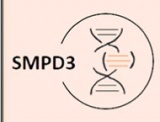Polymorphisms of the sphingomyelinase gene affect the risk of depression and alcoholism

The latest issue of Molecular Psychiatry features a report from an international team of scientists that included researchers from the Department of Drug Addiction Pharmacology at our Institute that points to the involvement of disrupted function of the enzyme sphingomyelinase in the risks of developing alcohol dependence, mood disorders, and also abnormal bone mineralization. https://doi.org/10.1038/s41380-021-01304-w. The Authors observed that polymorphisms in the gene encoding sphingomyelinase (SMPD3) had a significant correlation with alcoholism and depression in a cohort of almost 500 000 volunteers that participated in the study. Moreover, experiments conducted using genetically modified mice with inactivation of the Smpd3 gene confirmed its significance for alcohol-related behaviors and also revealed accompanying changes at the neuronal level.
Congratulations to the Authors!





